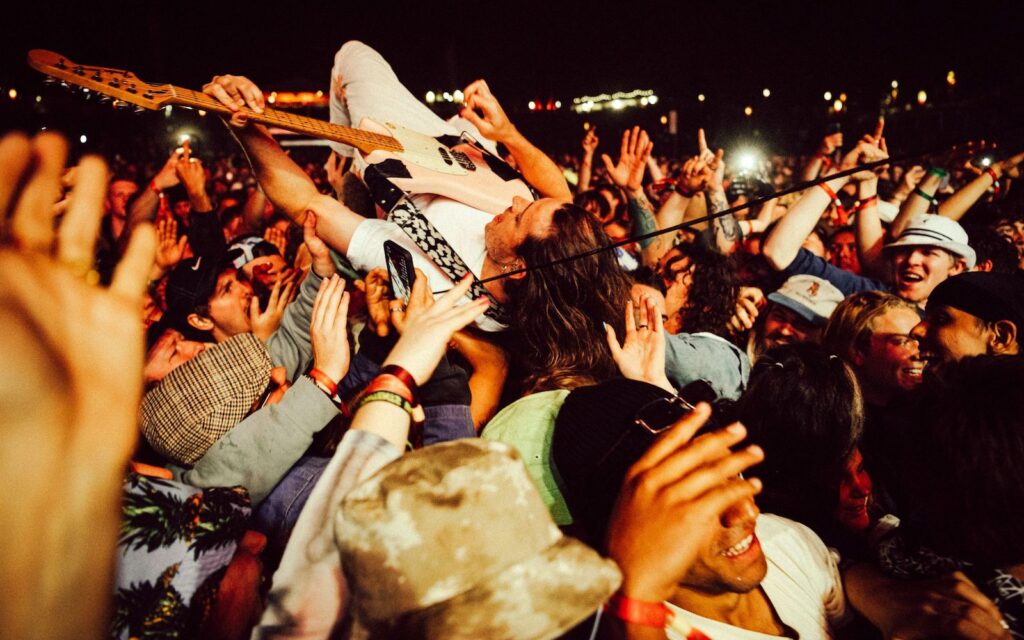“It was really surprising to come to a place on the opposite end of the world and play for a bunch of people that are familiar with your songs and dance and sing and have a great time. It was a good experience.”
It may come as a surprise that Foster The People have already been and gone. After all, their debut LP Torches only recently hit store shelves. The band, however, were riding a wave courtesy of Foster’s Pumped Up Kicks, the song staking its claim as a bonafide indie-anthem. It’s an intriguing specimen, its pop sensibilities underscored by an unusual yet enticing darkness.
“I was thinking about youth and American culture and how disconnected it’s gotten and I was just trying to figure out why. Why, in the last ten years, have there been kids around ten or thirteen years old going on these killing sprees? I wanted to write about it,” explains Foster of the song’s origins.
“I like to write in character a lot and for that song, it was really interesting for me to try to get inside the head of a teenager and write from their perspective… a teenager that’s psychotic, basically, or on their way to being psychotic. The song is really more about the thought process rather than the event. I never talk about him actually doing it… it’s more about him considering it and fantasising about it. It’s about the thought process behind it and seeing things through Robert’s eyes.”
Foster is the first to acknowledge that such sentiments tend to take a back seat – at first, at least. “It happens a lot: people are singing the song, they’re dancing and happy and stuff and then after a couple of weeks, lyrics start to pop up and it’s like dumping a bucket of cold water on their head when they realise what it’s about!” he jokes.
“But, at the same time, I think that’s also what makes a song beautiful and it’s what gives a song character. If the lyrics match the tone of the song, it could have easily turned out to be just a plain, vanilla song. Happy song, happy lyrics – what’s the depth in that?! Life is comprised of the peaks and the valleys and I like to express that through my songwriting.”
Pumped Up Kicks features on the band’s first article – their self-titled EP – and remains responsible for much of the notoriety the band has received so far. “It’s kind of amazing. It’s hard to describe. It’s just crazy how much your life can change in one year.” Foster muses.
“My life is totally different than it was a year ago and it’s great, getting the opportunity to just be creative all the time instead of just worrying if I make a good enough latte for the customer in line!”
Recently his endeavours culminated in Foster The People’s debut album, Torches. His intentions heading into the recording were clear. “I wanted to make a really versatile record, one that you couldn’t pigeonhole. My songwriting has always been like that. I wanted to make something cohesive but something that had a lot of different colours to it,” he reveals.
“That’s what I want this project to always be. Most of my favourite bands when I was growing up, you couldn’t put them in a box. It’s like they’ve got this side to them, then this side over here that’s totally different but it still sounds like them. That was my goal.”
The recording of Torches also made it necessary for Foster to embrace new methodology. “It was really interesting. I’m used to working by myself, so opening that up and having another producer in the room and the band and being in front of a legitimate soundboard and legitimate studio – as opposed to just being in my studio – was partly overwhelming, a big part an amazing learning experience and also really fulfilling at the end of it.”
As Torches continues to earn critical acclaim, Foster finds that he must accept new challenges. Thrust into the limelight, the front man has felt the need to constantly adjust to ebb and flow of life as a musician. “The performance side of me – the music side of me – I love that. I love talking about the process, I love talking about the music that we’re making and I love playing shows, being a front man and engaging an audience. But then when I’m off-stage, I like time alone. The hard part for me, the thing that I’m learning to get used to and coping with is losing my anonymity,” he reflects.
“I never wanted to be famous,” Foster explains. “In a perfect world, we’d be able to play in front of 10 million people, but then walk down the street and not be recognised,” he declares. “I’m jealous of Daft Punk!” he laughs. “They can go up there and just slay it and put on an amazing show, but they’re wearing those masks. They could walk right by me and I wouldn’t know. That’s the hard part for me, losing anonymity. As far as being creative, being out there and talking about music and all that stuff, I do like it.”







